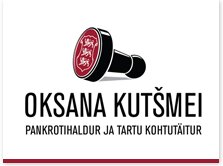Best ADR Mediation & Arbitration Lawyers in Tartu
Share your needs with us, get contacted by law firms.
Free. Takes 2 min.
List of the best lawyers in Tartu, Estonia
About ADR Mediation & Arbitration Law in Tartu, Estonia
Alternative Dispute Resolution (ADR) methods, including mediation and arbitration, offer structured ways to resolve disputes outside of traditional court settings. In Tartu, Estonia, these processes are increasingly favored for their ability to save time, reduce legal costs, and facilitate less adversarial outcomes. Mediation involves a neutral third party who helps the disputing parties reach a voluntary agreement, while arbitration utilizes an arbitrator who hears both sides and renders a binding decision. ADR has become a vital part of the Estonian legal landscape, particularly for civil and commercial disputes, employment matters, and contractual disagreements.
Why You May Need a Lawyer
Legal issues involving ADR mediation and arbitration can be complex. You may need a lawyer for the following reasons:
- Understanding which ADR method best suits your situation
- Drafting or reviewing mediation or arbitration agreements
- Representing you during mediation or arbitration sessions
- Ensuring your rights and interests are fully represented
- Explaining the enforceability of mediation settlements or arbitration awards
- Navigating cross-border disputes with international elements
- Advising on confidentiality and procedures unique to Estonia
- Interpreting local legislation and EU regulations as they apply to your case
- Assisting with appeals or challenging an arbitration award if necessary
- Clarifying costs and potential risks associated with ADR processes
A lawyer with expertise in Tartu’s ADR framework can help you make informed decisions and avoid pitfalls during the process.
Local Laws Overview
ADR processes in Estonia are governed primarily by the Code of Civil Procedure and, for arbitration, the Estonian Arbitration Act. In Tartu, local ADR services are widely accessible and implement national laws and EU directives. Here are some key aspects:
- Mediation in Estonia is usually voluntary unless specified by contract or court order
- Mediators and arbitrators must act impartially and adhere to confidentiality requirements
- Arbitration decisions are generally binding and enforceable through Estonian courts
- Parties may agree on the language, venue, and rules for arbitration proceedings
- Court intervention is minimal in ADR processes except for specific cases, such as enforcement or annulment of arbitration awards
- The Tartu County Court can refer cases to mediation, especially in family and civil law matters
- EU cross-border mediation rules may apply if parties are from different EU countries
Understanding these legal principles is crucial before engaging in ADR in Tartu.
Frequently Asked Questions
What types of disputes can be resolved through ADR in Tartu?
ADR can address a wide range of disputes, including commercial conflicts, employment issues, family matters, property disagreements, contract breaches, and neighborhood disputes.
Is mediation legally binding in Estonia?
A mediated agreement is legally binding if documented and signed by both parties. Courts can enforce these agreements if one party does not comply.
How is arbitration different from mediation?
Mediation aims for a mutual agreement with the help of a mediator, while arbitration involves an arbitrator who makes a binding decision for the parties.
Do I need a lawyer during mediation or arbitration?
Not always, but engaging a lawyer can help protect your rights, especially in complex or high-value disputes.
How long do ADR processes usually take in Tartu?
Mediation can often resolve disputes within a few sessions, while arbitration may take several months, depending on complexity.
Are ADR proceedings confidential in Estonia?
Yes. Both mediation and arbitration are confidential, and information shared during the process cannot be used as evidence in court unless both parties agree.
Can I challenge an arbitration award?
Yes, but only on limited grounds, such as procedural violations or lack of impartiality. The courts have a narrow scope for overturning arbitration awards.
What is the cost of mediation and arbitration in Tartu?
Costs vary based on the dispute’s nature, mediator or arbitrator fees, and the complexity of the case. ADR is generally less expensive than court litigation.
Can the court order mediation or arbitration?
The court can recommend, but usually cannot force, parties into mediation. Arbitration requires both parties’ agreement unless mandated by a prior contract.
Is ADR available for international disputes in Estonia?
Yes. Estonian law supports cross-border mediation and arbitration, and Estonia is a party to several relevant international conventions.
Additional Resources
If you need more information or assistance, consider these helpful resources:
- Tartu County Court (Tartu Maakohus) for court-referred mediation
- Estonian Chamber of Commerce and Industry for business-related arbitration
- Estonian Bar Association for finding qualified ADR lawyers
- Estonian Association of Mediators for professional mediators
- Estonian Arbitration Court for arbitration proceedings guidance
- Ministry of Justice (Justiitsministeerium) for legislative information and government mediation initiatives
These organizations can offer guidance, referrals, and further information about ADR procedures in Tartu.
Next Steps
If you are considering ADR in Tartu, start by clearly identifying the nature of your dispute and your preferred outcome. Consult with a qualified ADR lawyer who understands local laws and procedures. Gather all relevant documentation, such as contracts or correspondence, to prepare for the process. Decide if you are open to mediation or if arbitration may be necessary based on your legal and practical goals. Contact local ADR institutions or legal professionals to initiate the process. An experienced lawyer can advise you on the best course of action to resolve your dispute efficiently and protect your interests.
Lawzana helps you find the best lawyers and law firms in Tartu through a curated and pre-screened list of qualified legal professionals. Our platform offers rankings and detailed profiles of attorneys and law firms, allowing you to compare based on practice areas, including ADR Mediation & Arbitration , experience, and client feedback.
Each profile includes a description of the firm's areas of practice, client reviews, team members and partners, year of establishment, spoken languages, office locations, contact information, social media presence, and any published articles or resources. Most firms on our platform speak English and are experienced in both local and international legal matters.
Get a quote from top-rated law firms in Tartu, Estonia — quickly, securely, and without unnecessary hassle.
Disclaimer:
The information provided on this page is for general informational purposes only and does not constitute legal advice. While we strive to ensure the accuracy and relevance of the content, legal information may change over time, and interpretations of the law can vary. You should always consult with a qualified legal professional for advice specific to your situation.
We disclaim all liability for actions taken or not taken based on the content of this page. If you believe any information is incorrect or outdated, please contact us, and we will review and update it where appropriate.













